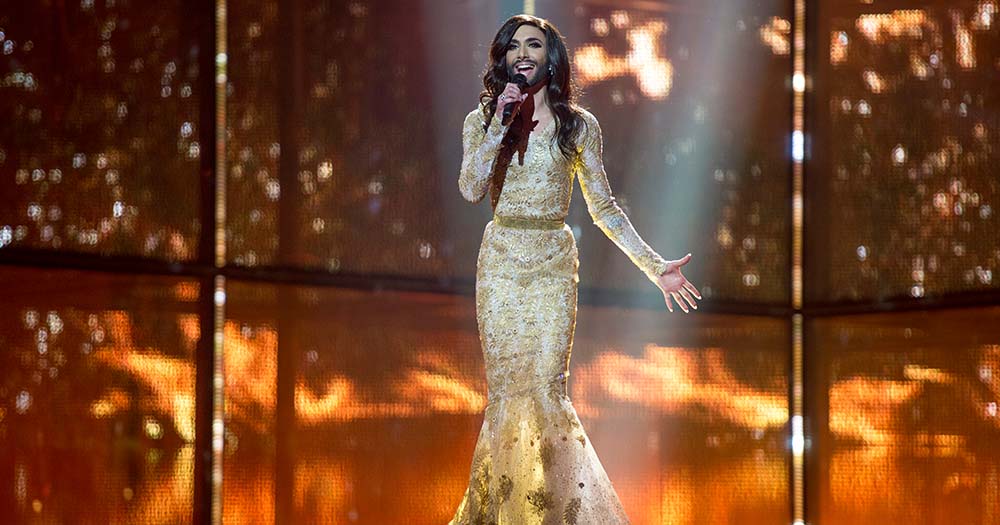Many LGBTQ+ fans would describe Eurovision as inherently queer, but this hasn’t always been the case. While we can all appreciate the elaborate costumes and outrageous choreography with camp undertones, these performances wouldn’t exist without the previous contributions from brave LGBTQ+ individuals and allies who pushed the boundaries of social norms to advocate for equality both on stage and in their home countries.
Here are eleven of the most significant LGBTQ+ Eurovision moments over the past four decades.
Ketil Stokkan representing Norway, 1986
Over thirty-five years ago, Ketil Stokkan made history while singing ‘Romeo’ in a performance that included backup singers from the Great Garlic Girls, a drag group who began singing together in the early 1980s. It was the first time a drag group accompanied a Eurovision singer on stage, and this is remembered as the first time a queer performance graced the contest.
Paul Oscar representing Iceland, 1997
As Eurovision’s first openly gay performer, Paul Oscar made history when he performed ‘Minn Hinsti Dans’ (My Final Dance) in 1997. Situated between more conservative acts, this memorable performance brought him international fame and recognition.
Sestre representing Slovenia, 2002
https://youtu.be/Tuj3Dw7ZCQs
The Sestre group’s Eurovision song, ‘Samo ljubezen’ (Only love), ignited a significant LGBTQ+ rights debate in Slovenia. The group consisted of three men dressed as female flight attendants wearing high heels, lipstick and glittery red skirt suits. The powerful performance sparked anti-gay protests in Slovenia.
Verka Serduchka representing Ukraine, 2007
Eurovision 2007 saw two excellent drag performances. Ultimately finishing in second place, drag performer Verka Serduchka earned 235 for their incredible performance of ‘Dancing Lasha Tumbai’. Meanwhile, in the semi-finals, Peter Andersen performed the song ‘Drama Queen’ under their drag name, DQ, but even though the audience reactions to this masterpiece were incredible, it was not enough to earn them a place in the final.
Krista Siegfrids representing Finland, 2013
Ten years ago, this memorable performance saw one of the few lesbian representations in Eurovision. During the semi-finals, while singing her song, ‘Marry Me’, Krista kissed a woman on stage as an act of protest that advocated for legalising same-sex marriage in Finland. Despite calls for censorship, the performance was televised and the song made it through to the finals, and the singer later described ‘Marry Me’ as a song about love and acceptance.
Conchita Wurst representing Austria, 2014
As the 2014 Eurovision winner, Wurst performed the unforgettable song, ‘Rise Like a Phoenix’, as a gay drag queen who broke gender norms by wearing a flowing gold dress with long hair and a beard. Singing the hit after winning, Conchita changed the lyrics from “I’ll rise up to the sky” to “We’ll rise up to the sky” and “I’m gonna fly” to “We’re gonna fly”, creating a particularly unifying moment for LGBTQ+ viewers.
Saara Aalto representing Finland, 2018
With lyrics, “I ain’t gonna hold on to these monsters anymore / At my worst I found my army strong, all the demons are gone / You can try and scare me now but I ain’t scared no more,” the song ‘Monsters’ was described as a hymn to freedom. Saara said that the song felt like a hymn to herself and her own pride regarding her bisexuality.
Ryan O’Shaughnessy representing Ireland, 2018
Ireland’s 2018 performance of ‘Together’ featured two male dancers who portrayed a same-sex love interest. Their captivating choreography included holding hands and dancing together amid lyrics, “We said until death do us part and then you chose to break my heart”.
Dana International representing Israel, 2019
Dana is an incredible trans woman who originally represented her country in Eurovision in 1998 and again in 2011 before performing a Bruno Mars cover as an interval act in 2019. The 2019 Eurovision also featured a gay presenter Assi Azar, and a kiss cam that invited LGBTQ+ couples in the live audience to kiss on camera.
Nikkie de Jager, 2021 Eurovision Host
In 2020, Nikkie, well-known for her makeup guides as NikkieTutorials, was confirmed as the first transgender host of the Eurovision Song Contest. Covid pandemic lockdowns prevented the song contest from happening in 2020, but fortunately, Nikkie was able to host in 2021. Her role represented a major milestone for trans representation.
Måneskin representing Italy, 2021
Who could forget the Italian band that took the world by storm with their 2021 Eurovision performance? Band members Victoria De Angelis (bassist) is openly bisexual, and Ethan Torchio (drummer) is also queer, making their victory a major win for LGBTQ+ visibility. Fans were obsessed with their gender binary-breaking costumes, with some calling their first-place-winning song a bisexual anthem.
With the first semi-finals taking place tonight, May 9, featuring Wild Youth as Ireland’s entry, we can’t wait to see what queer Eurovision moments are in store for 2023! For the Grand Final, Mother is hosting an epic Eurovision viewing and dance party in Opium, Dublin on May 13, and tickets are available for €10.
© 2023 GCN (Gay Community News). All rights reserved.
Support GCN
GCN is a free, vital resource for Ireland’s LGBTQ+ community since 1988.
GCN is a trading name of National LGBT Federation CLG, a registered charity - Charity Number: 20034580.
GCN relies on the generous support of the community and allies to sustain the crucial work that we do. Producing GCN is costly, and, in an industry which has been hugely impacted by rising costs, we need your support to help sustain and grow this vital resource.
Supporting GCN for as little as €1.99 per month will help us continue our work as Ireland’s free, independent LGBTQ+ media.
